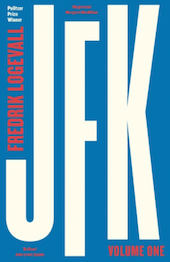JFK Volume One 1917-1956

JFK Volume One 1917-1956 by Fredrik Logevall. Publisher: Penguin Viking £30
Readers of ICN may feel well-acquainted with the life of President John F Kennedy. However, a new biography adds a wealth of information, thanks to recently released letters and documents. The young man emerging from Volume One (650 pages, without the end notes) is more intellectual, well-travelled, thoughtful, talented and braver than previous biographies reflect. But he is also a user of people (not just women) who is careless with his friends and his possessions, confident his wealth can easily replace the expensive watches or dedicated cronies he casually loses along the way.
Fredrik Logevall portrays an intolerant and snobbish Boston, where JFK's family were never accepted because of their Catholicism. The book covers the Kennedy and Fitzgerald clans from their arrival in the USA until the moment that JFK and his fearsome father, Joe, decide he will run for president.
Joe vowed to make a million dollars before he turned thirty-five, a goal he easily achieved, thanks to insider trading and disreputable stock swindles. He raised his children to always win, even if that meant cheating.
"Yet he was dissatisfied," Logevall writes. "Almost on a daily basis, he received reminders that he and his family would never be fully accepted among 'proper Bostonians' - even if in material terms he had long since left his patrician Harvard friends in his wake. He saw it in the treatment his boys received at school, in the barriers that would keep his daughters from being invited to the right debutante parties when they came of age." Joe exclaimed, "I was born here. My children were born here. What the hell do I have to do to be an American?"
His sons' private school was happy to take Joe's donations, despite considering him a "Catholic climber" who didn't know his place. Joe was also shut out of the honorary Harvard degree he craved. Yet, his closeness to the church had compensations. When he went to Rome, Ambassador Kennedy (Roosevelt's representative in London in the 1930s) had a front row seat for the coronation of Pius XII. Kennedy assumed, without permission, that he could bring his ten strong family, taking the seats of the Italian foreign minister, Count Ciano, and other dignitaries.
Joe's conservative and pious wife, Rose, has been caricatured as a saintly creature, silently enduring her husband's constant philandering. But here, she is an intelligent woman who is a far more capable political organiser than Joe. Throughout her youth, Rose accompanied her politician father, Honey Fitz, to Boston events, and understood how the Democratic machine worked. Later in life, she rallied her daughters to provide an impressive support team during JFK's campaigns.
John Kennedy's faith was held against him from the moment he entered the political fray, even in Boston, where so many Irish Catholic immigrants had settled. At each stage of his career, his advisors commissioned research to gauge what percentage of voters would resist supporting a Catholic candidate.
JFK had doubts, particularly when he was prevented from marrying a Protestant girlfriend: "The black and white world of his mother he could never recognise: he saw too many shades of gray." Yet, "Jack did not abandon his Christian faith or his Catholicism…he continued to attend Mass faithfully, and even in the White House he got on his knees to pray before bed," Logevall writes.
Some previous biographies of Kennedy have suggested his heroism during the Second World War has been overblown. Yet, this is not supported by the facts. When his patrol boat was sunk by the Japanese in the Pacific, he saved lives and provided extraordinary leadership and courage. When his first book, Why England Slept was published, and for years after, his opponents said it had been ghost written. Logevall has seen the original notes, and Kennedy's dreadful spelling and grammar convinced the biographer that it was all JFK's work.
If there is a fault, it is the writer's naivety about the extent to which Joe Kennedy's millions ensured his ambitious children were untroubled by quotidian problems. JFK was a lazy student and made little effort as a representative and then a senator. He was sloppy, knowing his staff could pick up the pieces he left in his wake. He spent a great deal of time vacationing in luxury, and he was plainly spoilt. He worked hard, however, when he had a goal, such as winning an election or writing a book. He was also in astonishing pain for most of his life, suffering from a disintegrating spine, Addison's disease, malaria and venereal disease. Yet, he never allowed his suffering to show in public, flashing his irresistible smile and radiating vitality.
He charmed almost everyone he met (Eleanor Roosevelt was impervious), his biographer maintains, but he was remote, like his mother, and treated women appallingly. However, he was also a deep thinker, intellectually curious, and cultured. He loved spending time in British high society, but in the USA, he had staff and cronies, rather than friends.
Logevall describes the way in which JFK used his father's money and connections to travel the world in a way no other future president could, giving him a sophistication about foreign policy shared by few Americans then or since. We should all be grateful he did, because when JFK was tested, during the Cuban Missile Crisis, he disregarded the advice of Cold Warrior military men and, arguably, saved the Western world from a nuclear holocaust.


















